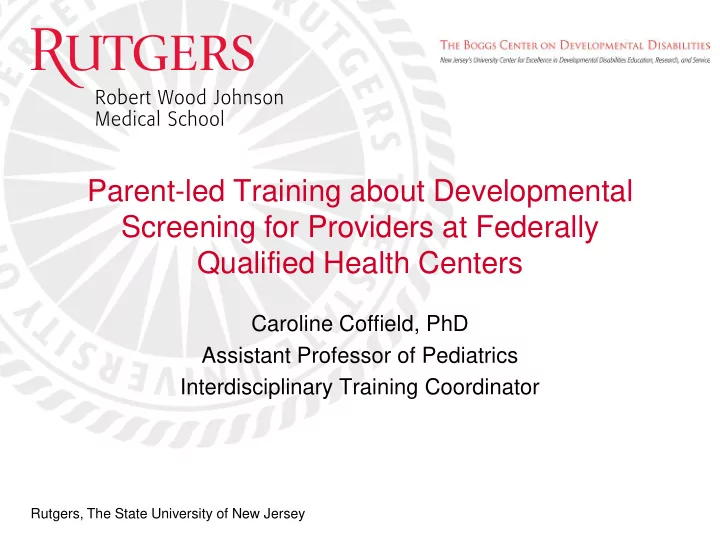

Parent-led Training about Developmental Screening for Providers at Federally Qualified Health Centers Caroline Coffield, PhD Assistant Professor of Pediatrics Interdisciplinary Training Coordinator Rutgers, The State University of New Jersey
The Opportunity • 1 year project funded by AMCHP – Act Early State Systems Grant Project • Learn the Signs, Act Early campaign • NJ’s state Act Early team – Established 2009 • Focus on building collaborations and enhancing Act Early initiatives – Community of Care Consortium
Background • Significant disparities in the identification and treatment of ASD, including later identification as well as misidentification. – Poor and minority children later • Late diagnosis later enrollment in intervention and potentially poorer outcomes • FQHCs
Project Partners • The Boggs Center, UCEDD • Statewide Parent Advocacy Network, PTI • NJ Early Intervention
Project Goal: • To improve access to developmental screening and referral among underserved children in NJ • Objectives: 1. Promote developmental screening using validated instruments at appropriate intervals and referral for diagnosis, Early Intervention, and community services and supports at NJ's FQHCs. 2. Disseminate Act Early information to community providers that serve families with young children. 3. Partner with SPAN to provide education to resident physicians about developmental screening and referral.
Project Activities 1. Provide a parent-led training about developmental screening for up to 15 FQHCs. 2. Provide 1 webinar about developmental screening, hosted by The Boggs Center and featuring SPAN's parent educators as presenters.
Project Activities 3. Provide each FQHC with a resource binder that contains copies of all Act Early materials, screening guidelines and tools, and other information about community resources and supports for practices and families.
Project Activities 4. Provide the Act Early "Milestone Moments" booklets to FQHCs to be shared with patients and families.
Project Activities 5. Create flow charts for each FQHC to illustrate next steps when a child screens positive for a developmental concern.
Project Activities 6. Provide training about developmental screening and referral at a noon conference for RWJMS pediatric residents.
Progress • 15 parent-led presentations • 195 participants • 1500 Milestone Moments Booklets disseminated • 15 community-specific resource binders disseminated • 15 site-specific and 15 New Jersey flow charts illustrating next steps once a child screens positive for any kind of developmental concern disseminated
Outcomes – Quantitative Results 120 100 80 60 40 High 20 Somewhat High Somewhat Low 0 Low
Outcomes – Qualitative themes • Qualitative Themes – Awareness of Resources for Referral • one participant commented on learning about “multiple resources that I never knew existed even as a healthcare provider and as a parent with a child with autism spectrum disorder” – Sensitivity • “having someone who understands and can support is priceless” – Importance of Early Screening and Intervention – Distributing Information to Parents – Referral Processes and Procedures
Outcomes – Follow up 8 7 6 5 4 3 2 Strongly Agree 1 Agree 0 Disagree Strongly Disagree
Outcomes - Webinar 25 20 15 10 High 5 Somewhat High Somewhat Low 0 Low
Response & Feedback • Parent stories very effective • Appreciate that all FQHC staff were invited to participate – Physicians, nurses, medical assistants, receptionists, etc. • Frustration with evaluation wait times – Happy to have resources to refer families to in the mean time
Project Challenges • Scheduling trainings with exceedingly busy staff at FQHCs – Despite consistent outreach to FQHC staff, we were unable to schedule any training sessions for FQHCs in the southern region of the state. • Completion of follow-up evaluations • Difficulty in scheduling noon conference for Robert Wood Johnson Medical School pediatric residents
Next Steps • Awarded a second grant to provide training to Head Starts and Early Head Starts • Project Goals: 1. Assess training and resource needs among early childhood educators and care providers 2. Use these results to develop new materials and disseminate existing Act Early information to early childhood educators and related professionals at up to 20 Head Starts. – Priority for selection of training sites will be given to Head Start/Early Head Start programs that have not benefitted from currently or previously funded initiatives in the state.
Head Start/Early Head Start Training and Resource Needs Survey • Capture the topics and resources that would be most relevant and helpful to include in training for Head Start staff as well as to determine the time of day and format that works best. • To date, the survey has been distributed electronically to some Head Start/Early Head Start Directors. – 4 responses have been obtained. • Subsequent dissemination will be undertaken as the school year begins, to ensure completion by programs that do not operate over the summer months.
Survey Results What information would most benefit your staff? Strategies for inclusion in the classroom Strategies for dealing with challenging behaviors Connecting Families with Resources Communicating Concerns with Parents Red Flags for Autism Spectrum Disorders Referral to a Child Study Team Early Intervention Developmental Monitoring Screening/Early Identification Overview of Developmental Disabilities 0 0.5 1 1.5 2 2.5 3 3.5 4 4.5
New Flow Charts
Contact Info: Carrie Coffield Carrie.coffield@rutgers.edu
Recommend
More recommend